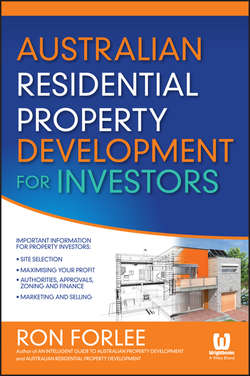Читать книгу Australian Residential Property Development for Investors - Forlee Ron - Страница 9
На сайте Литреса книга снята с продажи.
CHAPTER 1
An overview of property development
Types of property developers
ОглавлениеThere are many different types of developments in the property industry, and by the same token there are many different types of property developers. They can be part-time investors or full-time professionals. Whatever category they fall into, the underlying development principles and strategies remain the same. Listed below are definitions of some typical developers.
Part-time developers
This group consists of novice developers, investors who hold a full-time job, or small syndicates of friends or business associates. These developers often aim to hold onto the development as a long-term investment. They may purchase a single lot and build a small residential building or a small shopping centre, or they may buy an existing building and then add value through renovation and by negotiating new leases with existing or new tenants. Most will pursue a long-term investment but a small percentage will seek to sell at a profit. Their developments are characterised by a frequent number of transactions, a small number of holdings, low equity, the importance placed on long-term capital gain and a positive rental income.
Full-time professionals
This group consists mainly of individuals or partners who have decided to pursue property development as a career. They may be accountants, quantity surveyors, construction managers, project managers, builders, architects, engineers, real estate agents or other individuals whose first few developments were financially rewarding. These developers are normally highly geared and well aware of the latest financial instruments. They seek to maximise taxation benefits and capital gains from their developments. The majority of this group focus on small to medium projects, from strata residential buildings to smaller commercial retail developments. They concentrate their efforts in locations with good infrastructure, including convenient access to transport.
Corporations
This group includes property development companies and major financial institutions. They could be privately owned corporations, public companies listed on the stock exchange, large insurance groups, superannuation funds or trade unions. Generally, these groups develop larger commercial properties such as regional shopping centres with a view to generating profits for their shareholders through long-term capital gain and good cash flow through positive rental income. These corporations generally have a number of qualified professionals who seek new developments and manage the project from inception to completion. Thereafter the property management division will take over and ensure the smooth running of the building.
Government/institutional
This category consists mainly of state governments, at times assisted by the federal government. Types of developments include government offices, hospitals, police stations, industrial land subdivisions and other public institutions. In some state-run programs they may involve the private sector and either seek a joint venture or tender a developable portion of land to private developers.
Fee developers
Fee developers are professionals with both qualifications and experience who will contract with an owner of land to develop their property for a fee. These developers are experienced in all phases of commercial or residential development. They are familiar with all aspects of developments including finance and feasibility studies. They understand the risks involved and how to mitigate them. These developers may also be part of an investment syndicate, and while they maintain a shareholding they are paid a fee to manage the development process. Fees charged for their professional service can range from 3 to 5 per cent, depending on the complexity of the project. First-time developers and time-poor investors should consider employing such professionals.
